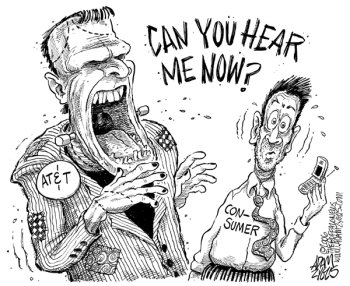If you thought phone companies were simply supposed to get you connected, think again.
 |
| Verizon’s notion of “progress” may not agree with your notion of free speech |
Over the last several weeks we learned that the nation’s two largest telecommunications firms want to get into the business of censorship as well — blocking the free flow of information over phones and the Internet.
We saw an unsettling example of just how bad this can get last week. Verizon Wireless blocked text messages that national pro-choice group NARAL wanted to send to their members. That they reversed the decision after the censorship was exposed should offer little comfort.
While they may have scrambled to fix one “dusty policy” and let these messages through, we can see in the details of this and other episodes a worrisome pattern of abuse. And it’s not just at Verizon. Over the weekend, the technophiles at Slashdot exposed what many of us failed to read in the fine print of our AT&T customer agreements.
Censorship Is in the Details
Deep in its “terms of service” for high-speed services AT&T had buried this tidbit: The phone company may “immediately terminate or suspend all or a portion of your service … without notice, for conduct that AT&T believes … tends to damage the name or reputation of AT&T, or its parents, affiliates and subsidiaries.”
We have since sifted the agreements of other access providers and found even more explicit language over at Verizon: The company “reserves the right and sole discretion to change, limit, terminate, modify at any time, temporarily or permanently cease to provide the Service or any part thereof to any user or group of users, without prior notice and for any reason or no reason.”
You got that?
You’re Busted!
These multi-billion dollar network giants are telling their Internet and cell phone customers this: If you want “your world delivered,” you better play nice with the phone companies.
That means no speaking out of turn against AT&T and Verizon’s slow services, high prices or anti-competitive practices.
 An Editorial cartoon by Adam Zyglis of the Buffalo News. Visit his website at http://www.adamzyglis.com/ |
Speak out for Net Neutrality and you could find your self on the wrong side of the digital divide. Losing an Internet connection would hit especially hard those millions of Americans in markets where the phone company is the only Internet service in town.
It gets weirder. Listed among AT&T’s “prohibited activities” are “creating or attempts to utilize a domain or domain name that is defamatory, fraudulent, indecent, offensive, deceptive, threatening, abusive, harassing, or which damages the name or reputation of AT&T.” [my emphasis]
This seems to take AT&T’s content policing one further. It is not enough that you can be disconnected for conduct that damages the reputation of AT&T, but you can lose your feed for simply visiting a Web site — or “domain” — that does the same.
Guess what? You’re doing that right now.
Free Speech Everywhere
Perhaps you think we’re making much out of nothing — that such fine print is created by lawyers to cover a company’s but in rare, worst case scenarios.
Try thinking about it this way: If a phone company can’t tell you what to say on a phone call, then it shouldn’t be able to tell you what to say in a text message, an e-mail, a blog or anywhere else. Speech should be free wherever it occurs – on the Internet, over cell phones, on the streets – everywhere. And it should be protected.
More and more of our communications occur in digital formats. It’s time Americans safeguarded free speech in this new media with the passion that we protect it in old. A good place to start is with the two companies that control Internet and cell phone access for more than 120 million Americans.
My organization Free Press has called on Congress to convene hearings that address phone company censorship policies. You can support this effort by writing your member of Congress and urging them to stand with the rest of us and investigate this abuse.
The biggest threat to free speech in America is public complacency. We must have this discussion about our democratic rights while we still can.
Phone lobbyists exert immense power over both Democrats and Republicans in the halls of Washington. As an alternative to opening their doors wide to AT&T and Verizon lobbyists, the least our elected officials could do for us is keep new communications open for everyone.
About Free Press
 Free Press is a national nonpartisan organization working to increase informed public participation in crucial media policy debates, and to generate policies that will produce a more competitive and public interest-oriented media system with a strong nonprofit and noncommercial sector.
Free Press is a national nonpartisan organization working to increase informed public participation in crucial media policy debates, and to generate policies that will produce a more competitive and public interest-oriented media system with a strong nonprofit and noncommercial sector.
About Timothy Karr
 Timothy Karr is Campaign Director at Free Press. He manages both the SavetheInternet.com and StopBigMedia.com Coalition campaigns, in addition to his work on fake news and propaganda, and journalism in crisis. Prior to Free Press, Tim served as executive director of MediaChannel.org and vice president of Globalvision New Media and the Globalvision News Network. He has also worked extensively as an editor, reporter and photojournalist for the Associated Press, Time Inc., New York Times and Australia Consolidated Press.
Timothy Karr is Campaign Director at Free Press. He manages both the SavetheInternet.com and StopBigMedia.com Coalition campaigns, in addition to his work on fake news and propaganda, and journalism in crisis. Prior to Free Press, Tim served as executive director of MediaChannel.org and vice president of Globalvision New Media and the Globalvision News Network. He has also worked extensively as an editor, reporter and photojournalist for the Associated Press, Time Inc., New York Times and Australia Consolidated Press.


